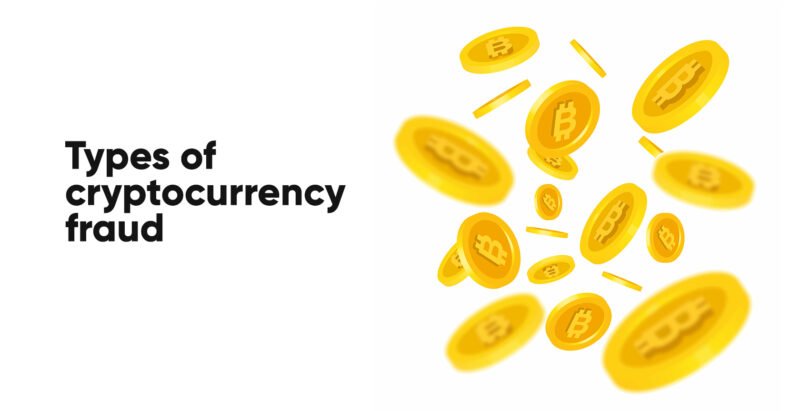Dozens of new cryptocurrencies are launched every month, and alongside these new tokens and coins comes a series of Initial Coin Offers (ICOs). The appetite of a wide range of investors for these opportunities has grown, even as cryptocurrencies took a hit in 2018 and early 2020.
All these factors combined attract fraudsters. In this article, we’ll take a look at the different types of cryptocurrency scams that even the most seasoned investor can face and how to avoid them.
What types of cryptocurrency fraud are there?
Cryptocurrency fraud can take many forms, including:
- Financial crimes — cryptocurrency’s instant transactions, portability, and international reach mean it can be used as a new tool for tax evasion, money laundering, and bribery.
- Initial coin offering scams can also be used as a means of fraud. Many ICOs are completely fabricated, with fake bios of non-existent team members and white papers copied from other legitimate cryptocurrencies.
- Pump and dump schemes — when shareholders try to raise the price before selling their assets at an artificial peak. In the world of cryptocurrency, this is a common occurrence during the ICO stage or even beyond, when false claims can raise demand and allow creators or dominant holders of cryptocurrencies to generate huge fictitious profits.
- Manipulating markets in which cryptocurrencies or related derivatives are traded. Mismanagement of the market can include spoofing, running ahead, rigging, and other schemes.
- Ponzi schemes. Cryptocurrency investments can also be used as a vehicle for a traditional Ponzi scheme, in which new followers are required to give artificial profits to early adopters. Investments in emerging cryptocurrency markets could also serve as an intended target for Ponzi schemes. Given that cryptocurrency is misunderstood, it can be the perfect cover for a bogus scheme.
- Traditional theft — hacking into investors’ crypto wallets and stealing their currency; creating fake wallets to deceive counterparties; and creating fake crypto exchanges to steal customers’ money.
- Broker/dealer fraud. The SEC examined exchanges and funds that invest in cryptocurrencies, which, depending on the circumstances, may need to register as broker-dealers or exchanges.
- Dishonest promoters. You can be fined by the Securities and Exchange Commission for hiding payments received for promoting investments in Initial Coin Offerings (ICOs).
How much cryptocurrency has been lost in recent years due to fraud?
In the first five months of 2020, fraudsters stole 1.4 billion dollars worth of cryptocurrency, according to CipherTrace. The researchers say 2020 will be the second-largest year for cryptocurrency-related theft, hacks, and fraud.
This year, CipherTrace has identified several fraudulent email campaigns posing as official coronavirus-related groups to obtain personal information and/or cryptocurrency payments.
Simulated organizations include the World Health Organization, the Red Cross, and the Centers for Disease Control and Prevention.
Another startling discovery in the report concerns the “exponential” growth in funds sent to high-risk exchanges from bitcoin ATMs in the US in 2019, rather than to a lower-risk organization, prompting the CipherTrace research team to predict that ATMs could be the next target for financial regulators.
How to avoid and protect yourself from fraudsters?
- Check the company or startup you want to invest in. Make sure the company has robust business plans that solve real-world problems. The company must indicate the liquidity of its digital currency and ICO rules. Real people should be behind the company. If the startup you are researching lacks some of these characteristics, make your decision even more carefully.
- Pay attention to the website. For example, suppose you click on an association that looks like a trusted website, but fraudsters created a fake URL with zero instead of the letter “o”.
- Check mobile apps before downloading. Another easy fraud is the use of fake apps available for download through Google Play and the Apple App Store. Check if there are any obvious misspellings in the duplicate or even in the application name? Does the app look inauthentic due to a strange fill or inaccurate logo? Observe and rethink downloading the app.
- Don’t fall for fraudulent emails. Email is absolutely equivalent and the logo and stamps are fuzzy? Well, is there any way to confirm that the email address is connected to the association? Keeping track of this is one of the reasons why it is so important to choose an association in which real people work.
Summary
To sum up, one of the best ways to protect yourself is to carefully study the individual project team members before investing.
Also, thoroughly study the technical document on cryptocurrency or ICO. It is the fundamental document of a project. Avoid companies that don’t offer white papers.
Cratos is a secure platform for both customers and partners, with all the necessary official documentation. Security is provided for accounts, wallets, billing information, and personal data.



















